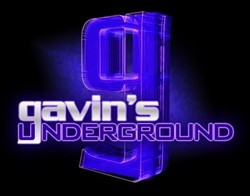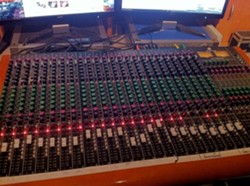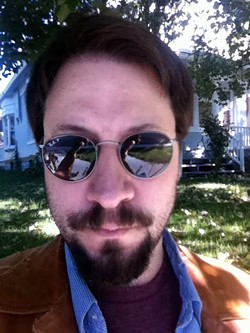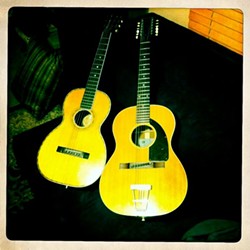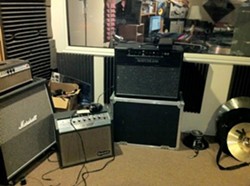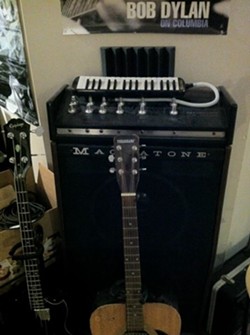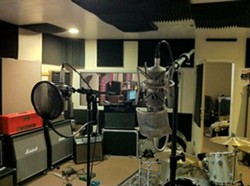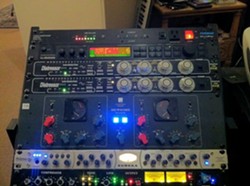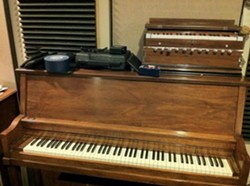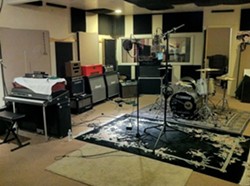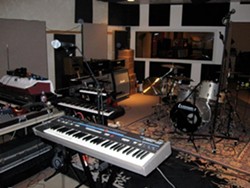Wednesday, November 23, 2011
Man Vs. Music Studios
Posted By Gavin Sheehan on November 23, 2011, 9:00 AM
More frequently in Utah, we're seeing an increase in recording studios being owned and operated not by producers and professional engineers, but by musicians. --- Which, if you think about it, has become more commonplace than you'd think with the rise of the DIY movement. A band with the skills, money and know-how could set up a studio in their basement and record an entire album on the cheap when it was convenient. But others have taken that concept and branched out to make it affordable for an experienced musician to give your album the once-over.
One such musician would be Mike Sasich, a familiar name in the SLC rock scene as a well-versed guitarist for several bands; Andale!, The No-Nation Orchestra and The Jingoes being some of the more recent groups. Sasich opened his studio back in 2003, originally working out of his home before moving all of his equipment to a South Salt Lake building and putting together one of the best-sounding studios in the valley. I got a chance to chat with Sasich about his career in music and the studio, plus his thoughts on the local music scene.
Mike Sasich
Gavin: Hey, Mike. First thing, tell us a bit about yourself.
Mike: Well, I was born in Holladay way back when, I lived out of state for years, but I moved back to Salt Lake about 10 years ago.
Gavin: What got you interested in music and who were some of your favorite musical influences growing up?
Mike: Music was a big part of my childhood -- I remember my mom always playing Rachmaninoff, Chopin, Beethoven, etc. on the piano when I was a kid. My dad was the manager at a record-distribution warehouse when I was growing up, and he later opened his own music store. As a result, he brought home a promotional copy of just about everything that was released, so I was exposed to a ton of different music growing up in the late '70s and early '80s. He also showed me my first chords on the guitar when I was about seven. I remember that the first thing he would show me was how a major chord sounds as opposed to a minor, and also what a seventh sounds like, before moving on to specific notes or chords and their names. I think that was crucial to how I learned, because I was forced to really listen to what I was hearing and the colors of the chords and how they played off each other before the memorization of notes and scales kicked in. It was an intuitive approach as opposed to an academic approach. I would say that my earliest influences growing up were all the classical that I was exposed to from my mom, and all the rock and other stuff that my dad brought home from his work. My dad was really into Motown and Stax and all the classic soul bands, too. I went through a voracious Beatles phase when I was about 10 and mowing lawns to buy my first guitar. And then when I first heard the album Physical Graffiti by Led Zeppelin at age 10, that was it. That, and London Calling by The Clash.
My aunt was obsessed with the Rolling Stones, and I always used to listen to her collection when I was at my grandma's. The Talking Heads. The Police. The Cars. The Cult's Love album. The Cure. I liked Gary Numan a lot, no matter how much shit my older brother gave me. Velvet Underground. Syd Barrett and Pink Floyd was another. When I was a 16, I thought Nirvana's Bleach was the coolest thing ever. I liked Jane's Addiction a lot, which is embarrassing considering what they've become. Later on, aided by some … ahem ... specific recreational substances, I listened to a ton of Spacemen 3 and Spiritualized, Jesus & Mary Chain, Stone Roses, Galaxie 500, Mazzy Star, My Bloody Valentine, Ride; The Verve's Storm In Heaven album is incredible. The Flaming Lips is still one of my favorite bands ever. Mercury Rev's Boces album changed my head, too. Terminal Cheesecake, Godflesh, Sonic Youth, Throbbing Gristle. When I moved to California in my early 20's, I got a job at a record store and I ended up being the used LP and CD buyer, and that's when my musical education really took off. That's when I discovered Can, Faust, Chrome, Neu, Suicide, Television, Richard Hell, The Gun Club, Betty Davis, Talk Talk, Wire, Gang Of Four, Tom Zé, Swans, Sun Ra, Slowdive, Fela Kuti, Shuggie Otis, Pavement, Massive Attack, Aphex Twin, Olivia Tremor Control, Trans Am, Tortoise, PIL, Mission Of Burma, Big Star, James White, The Fall, Nick Drake, Brian Eno, Sam Rivers, John Coltrane, Miles Davis, Sonny Sharrock, Art Ensemble Of Chicago, Ornette Coleman, Gram Parsons, Flying Burrito Brothers, Townes Van Zandt, The Band, etc. etc! There really are too many to mention -- I had to reinforce the floor in my house due to the weight of my record collection because the floor was deflecting.
Gavin: You've been a member of so many different bands with various sounds. Arguably, no two are really alike and you have to change up your style each time. How is it for you switching between bands like that?
Mike: Personally, it seems like the only way for me; I think I would get bored otherwise. I love so many different kinds of music that it's pretty natural to navigate between various styles. I've never thought about it much, really. Rather than be part of a project with everything thrown into the mix, it makes sense to be involved in different projects all with different sounds.
Gavin: When did you first get an inkling to do engineering and producing work?
Mike: I was always interested from a very young age in just how records were made. How did they put that guitar on just the left side? How is one guy playing six different parts right there? It seemed very mystifying to me. Of course, in reality, it's not -- unless you want it to be. For me, making records is as much an art as it is a science, and any varying point between the two that you wish. I have gear and I know basically how it's built and what's going on with the signal path internally, but I also know that this piece of gear sounds "gooey," that one sounds "mean," this one sounds "brash," etc. There are a lot of arbitrary terms in music production, but they still have meaning, and it's more fun to anthropomorphize the gear because each piece definitely has its own personality. My first multitrack was a Fostex 4-track cassette machine that I borrowed for something like two years from a friend when I first started playing guitar seriously at age 16. I would experiment with layering instruments, mostly guitars, but I'd also snag drum beats and sections off of records with a loop/sampler pedal and mess with that stuff -- mostly because I didn't have the capability to record drums back then.
Gavin: Did you seek out any professional training or courses, or was it more self-taught?
Mike: No, I'm self-taught. I learned a lot from watching other people while they engineered and asking a ton of questions during the process. I'm sure it was annoying and I'm grateful for their patience. Doing live sound for years at live music venues helped immensely in terms of learning how to blend several instruments effectively. My single-biggest learning-curve jump came from when Thunderfist recorded our last record with Jack Endino in 2006 -- that man knows how to make records. I learned a ton from just watching him and asking questions.
Gavin: How did you first get started in professional recording, and what were your first few years like for you learning the ropes?
Mike: I was noticing that modern music production was sounding worse and worse -- to me, anyway -- compared to the records that I love Music is getting thinner sounding with less depth. There's a tendency to push the vocal way up over the top of everything and compress the hell out of everything, while at the same time sucking all the low end out of the entire mix, I guess so it will play louder on the radio. I thought, "Hey, maybe I could do better than this." Of course, at the time, I couldn't, but what I was wanting to hear in my head was, to me, better than a lot of what was around. I just had to learn how to get there. It's all personal preference, though. So, I just decided that I wanted to give it a shot about seven years ago and I started recording folks out of my house. There were always cables running here and there, up the stairs, amps were in the living room and bathroom, the piano was mic'ed up in the living room, my control room was in my bedroom -- it was kind of a pain. But it was fun, too. Not an ideal way to start off, though, because there were inherently more obstacles to overcome in terms of learning how to capture useable sounds and manipulate sounds just because the rooms were small, with narrow halls, etc. The first few years were kind of rough, but everything is a learning experience and helps you improve. That never stops -- I learn new techniques and tricks every single day that I record and/or mix. It's like a game where there's sort of a rulebook, but it's not necessary that you follow it, and you can never win. You just get close enough -- hopefully, closer every time -- to a goal line that doesn't really exist.
Gavin: When did the idea come to mind to start up your own recording studio, and where did the name Man Vs. Music come from?
Mike: After a while, I got sick of always having cables running through the house, and amps and mics that couldn't be moved until the next session because the band wasn't done yet and the tones needed to match for continuity. That, and always having people traipsing through the house, in my room, etc. My girlfriend moved in with me after a bit and she didn't like the clutter and traffic much, either, so I set my sights on finding a building. The name Man Vs. Music came from my daughter, Mila. She mentioned that since I almost always work alone, and since I'm usually intensely engaged in the process, that it almost seems like a battle.
Gavin: How did you come across the studio in South Salt Lake and what was it like setting that place up as a studio?
Mike: The building that I ended up finding just happened to be a recently vacant studio with a lot of sound reinforcement already installed and the rooms already built out. It was pretty much turnkey, which was nice. It's not perfect -- there's noise that sometimes bleeds through from the outside -- but hey, it works, and I've learned to work around the obstacles. The big room sounds damned good, too. It's not a fancy studio by any means -- I don't have nice couches or the best coffee or fancy lighting. It's more utilitarian, but it gets the job done.
Gavin: How did you go about getting all the equipment and instruments you needed?
Mike: I started collecting gear when I first started playing guitar 20 years ago. It started with guitars, pedals, an amp or maybe two, a Shure SM57, then two SM57s, and I just kept trading up and building and accumulating stuff over the years. I also have a knack for finding unbelievable deals, too, and for being in the right place at the right time. For example, when I was 18, I traded a DOD digital-delay pedal for my first tape echo because the guy said the tape echo was "too noisy" and didn't "sound like U2." "Well, this one's clean as can be." "You want to trade?" Done.
Gavin: Tech-wise, for those interested, what kind of audio and recording equipment do you have?
Mike: I have a Pro Tools system -- not HD, but it does the job for now. I also have a Tascam MS-16 16-track 1-inch reel-to-reel tape machine -- it has an Ampex head stack and sounds great. I've got a Toft ATB 24x8 channel console, which is almost identical in operation and sound (not quite as nice, but close, and a fraction of the cost) to the old Trident 80b console. I also have some beautiful mics, some awesome outboard compressors and preamps, several incredible guitar amps, a Rhodes, an upright piano (that's tuned regularly!), a Hammond M-3 organ, a Leslie, some synths, two tape echos, a Theremin, a harmonium, tons of pedals, some vintage and newer guitars and basses. I actually built an amp a couple years ago. It's based on the 100-watt Marshall Plexi circuit, but with a lot of mods that I researched and installed. It's incredible. I can provide a comprehensive list of gear for anyone who's interested.
Gavin: What was it like when you first started it up, and who are some of the musicians and bands who have used the studio to date?
Mike: Like I said, it was a learning experience and trial by fire, but I enjoyed it, and still do -- even more so because I'm not worrying about fixing stuff all the time. I think I've gotten my chops up to the point where I can just focus on making creative decisions at every point instead of worrying about mic-placement technique and the basics. Learning how to record and mix is like learning an instrument. Some bands and artists that I've worked with are: Andre Williams, The Rubes, Bronco, Blackhole, Lindsay Heath, Starmy, Will Sartain, Erik The Red, SLAJO, Daniel Day Trio, Silent Sevens, Craig Ballam, Tough Tittie, Sideshow Ramblers, Ugly Valley Boys, Pleasure Thieves, King Niko, The Jingoes, Muckraker, Laserfang, Los Rojos, Righteous Audio Werks, Thunderfist, The No-Nation Orchestra, Andale! ... and many others.
Gavin: Being a musician, what's the difference for you working with bands you're a member of and working with other bands you have nothing to do with?
Mike: Engineering records for bands that I'm part of is more stressful, just because I'm wearing so many hats simultaneously. The workload increases exponentially and I have to be even more aware of how everything is working together, while at the same time trying to remain somewhat objective so that what I think I'm hearing is really what I'm hearing, I'd have to say that I enjoy the process of working for bands that I'm not part of a little more, just because it's easier to know my role. If the band wants me to add my own personal stamp on the sound, then I can. If they want me to be as transparent as possible, I can do that, too. I'm enough of a control freak and perfectionist, though, that I still wouldn't want anyone else to mix a record that I'm part of and care about a lot. Engineering and producing projects that I'm involved in is maybe a hair more rewarding when it's all said and done -- but then I never want to hear the thing again.
Gavin: Have you thought about starting your own label or are you comfortable just being a studio for musicians?
Mike: Only recently. There's a project on the horizon that may necessitate the need for me to start my own label.
Gavin: Are there any plans to expand the studio beyond what you have now, or will you keep things as they are?
Mike: No, not at present. I'm always itching to upgrade, but I'm pretty happy now with how everything is sounding.
Gavin: Moving onto state-wide stuff, what are your thoughts on the local music scene, both good and bad?
Mike: Like I said, I think there's a ton of talent here. The Rubes, Spell Talk, Eagle Twin, Night Sweats -- all great bands. I like Palace Of Buddies a lot. I heard a sample from the upcoming Chickens CD that sounded really good.
Gavin: Is there anything you believe could be done to make it more prominent?
Mike: I'm not sure I'm the guy to ask. Move it out of Utah?
Gavin: Do you wish there were more areas available for bands to practice and record in, or are we pretty well set for what we have?
Mike: Salt Lake most definitely would benefit from more practice spaces. There's Positively 4th Street and Downtown Music, and … yeah, we could use more. I actually think there are a lot of options in terms of studios and there are a lot of talented engineers, as well.
Gavin: What do you think about local labels and the role they play with helping musicians?
Mike: Well, I don't have a lot of experience with local labels. If they have any sort of national and/or overseas distribution, then that's a very good thing -- if not, then …
Gavin: What's your opinion on the current airplay on community radio and how it affects local musicians?
Mike: I think we're incredibly lucky to have stations like KRCL in Salt Lake. I think community radio is only a good thing for the local musicians -- it gets them exposure and even gives them a platform in which to play live in the studio. The DJs really seem to care about the local scene, too, and they get involved, which is invaluable.
Gavin: What can we expect from you and MVM over the rest of the year and going into next?
Mike: Hopefully, I just get to continue working on projects that I enjoy with people and musicians I like and respect.
Gavin: Is there anything you'd like to plug or promote?
Mike: Umm, yeah … everyone should get The No-Nation Orchestra EP that we just released. It's a 12" 45 RPM record on clear blue vinyl -- you'll like it. The new Thunderfist is a filthy, dirty rocker and I can't wait until that's out. Work will begin on a new Laserfang album shortly. Also, some friends and I are putting a 7" out sometime next year with the great Andre Williams -- I can't wait for that project to be wrapped up so we can put it out. Stay tuned. If anyone wants to get hold of me for recording, e-mail me at mjsasch@yahoo.com or call me at (801) 518-2959.
| Follow Gavin's Underground: |
On Topic...
-
Film Reviews: New Releases for April 12
Civil War, Escape from Germany, Coup de Chance, Hundreds of Beavers, La Chimera, Sting
- Apr 11, 2024
-
Film Reviews: New Releases for April 5
Monkey Man, The First Omen, Wicked Little Letters, Girls State, Scoop, Exhuma
- Apr 4, 2024
-
Music Plus: March 29
Das Energi Festival headliners, Ogden Twilight lineup
- Mar 29, 2024
- More Gavin's Underground » More Culture »
More by Gavin Sheehan
-
Gavin's Underground: End Of An Era
Nine and a half years of local entertainment blogging comes to an end.
- May 26, 2017
-
Torris Fairley
A quick interview with the up-and-coming SLC-based comedian.
- May 25, 2017
-
Cirque Asylum
A look into the dance school teaching unique forms of aerial arts.
- May 24, 2017
- More »


